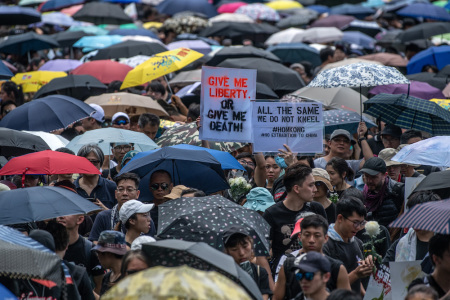UK to offer path to citizenship for 3M Hong Kong residents if China imposes new security law

British Prime Minister Boris Johnson is offering Hong Kong residents a pathway to citizenship in the United Kingdom should China proceed with implementing a national security law that would effectively control the city-state's government.
China's proposed national security law prohibits sedition, secession, and subversion against Beijing in Hong Kong, and was approved last week by the Chinese parliament, which moved to impose it on the island city-state without the approval of the Hong Kong legislature, through a rarely-used legal backdoor. The law also empowers Chinese national security entities "to fulfill relevant duties to safeguard national security in accordance with the law."
In response, Johnson extended the offer of a possible path to U.K. citizenship to the 3 million residents of Hong Kong, which had previously been under British rule.
"If China imposes its national security law, the British government will change our immigration rules and allow any holder of these passports from Hong Kong to come to the U.K. for a renewable period of 12 months and be given further immigration rights, including the right to work, which could place them on a route to citizenship," Johnson wrote in a commentary published by the U.K. Times.
"This would amount to one of the biggest changes in our visa system in history. If it proves necessary, the British government will take this step and take it willingly."
The U.K. prime minister stressed that he hoped to have a good relationship with China, adding that the powerful communist nation must abide by its international agreements.
"Britain wants nothing more than for Hong Kong to succeed under 'one country, two systems.' I hope that China wants the same. Let us work together to make it so," Johnson said, urging that it was in their best interest to do so," Johnson added.
At a U.N. Security Council meeting last week, the U.S. and U.K. raised concerns about the situation in Hong Kong.
U.S. Ambassador Kelly Craft asked: “Are we going to take the honorable stand to defend the human rights and the dignified way of life that millions of Hong Kong citizens have enjoyed and deserve ... or are we going to allow the Chinese Communist Party to violate international law and force its will on the people of Hong Kong?"
Since 1997, Hong Kong has been operating under what is known as the "one country, two systems" constitutional principle — that it would be recognized as part of China yet under a British-based legal system and the socioeconomic advantages that came with it — but recent moves by China have led many to believe that principle no longer holds. The agreement was set to expire in 50 years, in 2047.
The Federalist reported that the day before the 20th anniversary of Hong Kong's handover to China, the Chinese Foreign Ministry declared that as a historical document the Sino-British Joint Declaration — a 1984 treaty signed between the United Kingdom and China on Hong Kong under Chinese sovereignty that stipulated the sovereign and administrative arrangement of Hong Kong after 1 July 1997 — "no longer has any realistic meaning."
In so doing, the Chinese Communist Party abandoned any notion that it would honor the promises to Britain and Hong Kong when the city was handed over, the Federalist added.
For most of last year, millions of Hong Kong residents garnered international attention as they protested in the streets against an extradition law that would have forced the government and its chief executive, Carrie Lam, to permit Chinese authorities to identify, surveil, and even arrest Chinese "dissidents" living in Hong Kong.
The anti-government demonstrations were initially triggered by a now-withdrawn extradition bill. The proposed bill was precipitated by the murder of a pregnant teenager by her boyfriend during a vacation in Taiwan. Because the Hong Kong government does not have an extradition treaty with Taiwan, legislation was proposed that would have allowed the extradition of suspects from the city to other countries, including mainland China.
Protests later included calls for greater democratic freedoms and police accountability in Hong Kong.





















